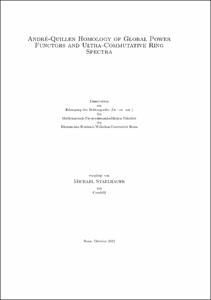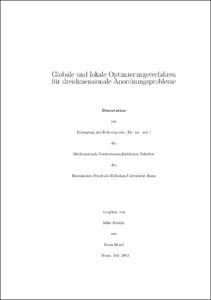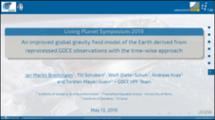Stahlhauer, Michael: André-Quillen Homology of Global Power Functors and Ultra-Commutative Ring Spectra. - Bonn, 2023. - Dissertation, Rheinische Friedrich-Wilhelms-Universität Bonn.
Online-Ausgabe in bonndoc: https://nbn-resolving.org/urn:nbn:de:hbz:5-69505
Online-Ausgabe in bonndoc: https://nbn-resolving.org/urn:nbn:de:hbz:5-69505
@phdthesis{handle:20.500.11811/10595,
urn: https://nbn-resolving.org/urn:nbn:de:hbz:5-69505,
author = {{Michael Stahlhauer}},
title = {André-Quillen Homology of Global Power Functors and Ultra-Commutative Ring Spectra},
school = {Rheinische Friedrich-Wilhelms-Universität Bonn},
year = 2023,
month = jan,
note = {In this dissertation, we study multiplications in globally equivariant stable homotopy theory. Concretely, this means studying ultra-commutative ring spectra, which encode a rich multiplicative structure on a family of compatible equivariant homotopy types for all compact Lie groups. The associated algebraic structure is that of a global power functor. This structure formalizes a collection of compatible G-Tambara functors for all compact Lie groups G, encoding the norms present in the homotopy groups of an ultra-commutative ring spectrum. These norms are alternatively encoded as power operations, facilitating the calculations.
The main tool we introduce to study these multiplicative structures is globally equivariant André-Quillen theory. This is a generalization of the cohomology theory introduced independently by André and Quillen in 1967 for commutative rings, and the corresponding topological André-Quillen cohomology for commutative ring spectra by Basterra. This cohomology theory is well-adapted to the study of multiplicative structures, and it is able to detect interesting properties of commutative algebras, like smoothness and étaleness. Moreover, the topological André-Quillen theory has proven to be very useful in the construction of obstruction theories for commutative ring spectra.
In the construction of the globally equivariant generalization of algebraic André-Quillen cohomology, a main aspect is the handling of the power operations. This is mainly done by considering the power operations as a twisted version of the usual powers, and adapting the classical formulas accordingly. As the André-Quillen cohomology is a nonabelian derived functor of derivations, and the homology is a derived functor of the Kähler differentials, we first introduce derivations and Kähler differentials of global power algebras. Moreover, we study the related notion of square-zero extensions. For the derivations, the new aspect is a twisted version of the Leibniz rule for the derivation of a power operation.
From the definition of derivation and Kähler differentials, we obtain André-Quillen cohomology and homology by resolving global power algebras by simplicial polynomial algebras, and applying the described functors. We observe that also this global version of André-Quillen cohomology is well-suited to detect properties like smoothness and étaleness of global power algebras, and can be used to study extensions. The low-dimensional groups can efficiently be calculated by a short naive cotangent complex. However, the categories of global functors and modules over a global power functor exhibit homological anomalies, such as the phenomenon that projective objects do not need to be flat. This leads to the failure of a long exact cohomology sequence beyond degree n = 1. We emphasize which kind of modules we use for this thesis: Classically, the definitions of modules as objects with an action or as abelian group objects in a category of augmented algebras coincide. However, Strickland has shown that these two notions define different structures in an equivariant setting by defining an abelian group object that does not come from a module. We study an example of this phenomenon extended to the globally equivariant context, and show that it arises as a free abelian group object. Moreover, we discuss an approach followed by Hill to resolve this discrepancy by studying global functor objects instead of abelian group objects. For the main part of this thesis, we use the usual definition of modules as global functors with an action by the global power functor. This definition in fact does not depend on the power operations of the global power functor.
Finally, we also consider topological André-Quillen homology and cohomology for ultra-commutative ring spectra. This is an interesting topic, as we expect this to give rise to an obstruction theory for such ring spectra. As an ultra-commutative ring spectrum is a very rich type of structure, this obstruction theory would be desirable to provide more examples. We lay the foundation for such a theory by providing an André-Quillen homology and cohomology. This starts by a technical consideration of model categories of modules, algebras and non-unital algebras over such ultra-commutative algebras. We show that the commutative monoid axiom of White allows one to put a model category structure on non-unital commutative monoids in a general model category, and then use this as an intermediate step to build topological André-Quillen objects in general model categories.
When we specialize to ultra-commutative ring spectra, we obtain a generalization of the topological André-Quillen cohomology for commutative ring spectra of Basterra. We show that this comes equipped with a transitivity long exact sequence, which distinguishes the topological from the algebraic situation, where such a sequence does not exist. Moreover, as a first step into a usage of this theory for obstruction theory, we build Postnikov towers of ultra-commutative ring spectra using André-Quillen cohomology.},
url = {https://hdl.handle.net/20.500.11811/10595}
}
urn: https://nbn-resolving.org/urn:nbn:de:hbz:5-69505,
author = {{Michael Stahlhauer}},
title = {André-Quillen Homology of Global Power Functors and Ultra-Commutative Ring Spectra},
school = {Rheinische Friedrich-Wilhelms-Universität Bonn},
year = 2023,
month = jan,
note = {In this dissertation, we study multiplications in globally equivariant stable homotopy theory. Concretely, this means studying ultra-commutative ring spectra, which encode a rich multiplicative structure on a family of compatible equivariant homotopy types for all compact Lie groups. The associated algebraic structure is that of a global power functor. This structure formalizes a collection of compatible G-Tambara functors for all compact Lie groups G, encoding the norms present in the homotopy groups of an ultra-commutative ring spectrum. These norms are alternatively encoded as power operations, facilitating the calculations.
The main tool we introduce to study these multiplicative structures is globally equivariant André-Quillen theory. This is a generalization of the cohomology theory introduced independently by André and Quillen in 1967 for commutative rings, and the corresponding topological André-Quillen cohomology for commutative ring spectra by Basterra. This cohomology theory is well-adapted to the study of multiplicative structures, and it is able to detect interesting properties of commutative algebras, like smoothness and étaleness. Moreover, the topological André-Quillen theory has proven to be very useful in the construction of obstruction theories for commutative ring spectra.
In the construction of the globally equivariant generalization of algebraic André-Quillen cohomology, a main aspect is the handling of the power operations. This is mainly done by considering the power operations as a twisted version of the usual powers, and adapting the classical formulas accordingly. As the André-Quillen cohomology is a nonabelian derived functor of derivations, and the homology is a derived functor of the Kähler differentials, we first introduce derivations and Kähler differentials of global power algebras. Moreover, we study the related notion of square-zero extensions. For the derivations, the new aspect is a twisted version of the Leibniz rule for the derivation of a power operation.
From the definition of derivation and Kähler differentials, we obtain André-Quillen cohomology and homology by resolving global power algebras by simplicial polynomial algebras, and applying the described functors. We observe that also this global version of André-Quillen cohomology is well-suited to detect properties like smoothness and étaleness of global power algebras, and can be used to study extensions. The low-dimensional groups can efficiently be calculated by a short naive cotangent complex. However, the categories of global functors and modules over a global power functor exhibit homological anomalies, such as the phenomenon that projective objects do not need to be flat. This leads to the failure of a long exact cohomology sequence beyond degree n = 1. We emphasize which kind of modules we use for this thesis: Classically, the definitions of modules as objects with an action or as abelian group objects in a category of augmented algebras coincide. However, Strickland has shown that these two notions define different structures in an equivariant setting by defining an abelian group object that does not come from a module. We study an example of this phenomenon extended to the globally equivariant context, and show that it arises as a free abelian group object. Moreover, we discuss an approach followed by Hill to resolve this discrepancy by studying global functor objects instead of abelian group objects. For the main part of this thesis, we use the usual definition of modules as global functors with an action by the global power functor. This definition in fact does not depend on the power operations of the global power functor.
Finally, we also consider topological André-Quillen homology and cohomology for ultra-commutative ring spectra. This is an interesting topic, as we expect this to give rise to an obstruction theory for such ring spectra. As an ultra-commutative ring spectrum is a very rich type of structure, this obstruction theory would be desirable to provide more examples. We lay the foundation for such a theory by providing an André-Quillen homology and cohomology. This starts by a technical consideration of model categories of modules, algebras and non-unital algebras over such ultra-commutative algebras. We show that the commutative monoid axiom of White allows one to put a model category structure on non-unital commutative monoids in a general model category, and then use this as an intermediate step to build topological André-Quillen objects in general model categories.
When we specialize to ultra-commutative ring spectra, we obtain a generalization of the topological André-Quillen cohomology for commutative ring spectra of Basterra. We show that this comes equipped with a transitivity long exact sequence, which distinguishes the topological from the algebraic situation, where such a sequence does not exist. Moreover, as a first step into a usage of this theory for obstruction theory, we build Postnikov towers of ultra-commutative ring spectra using André-Quillen cohomology.},
url = {https://hdl.handle.net/20.500.11811/10595}
}









